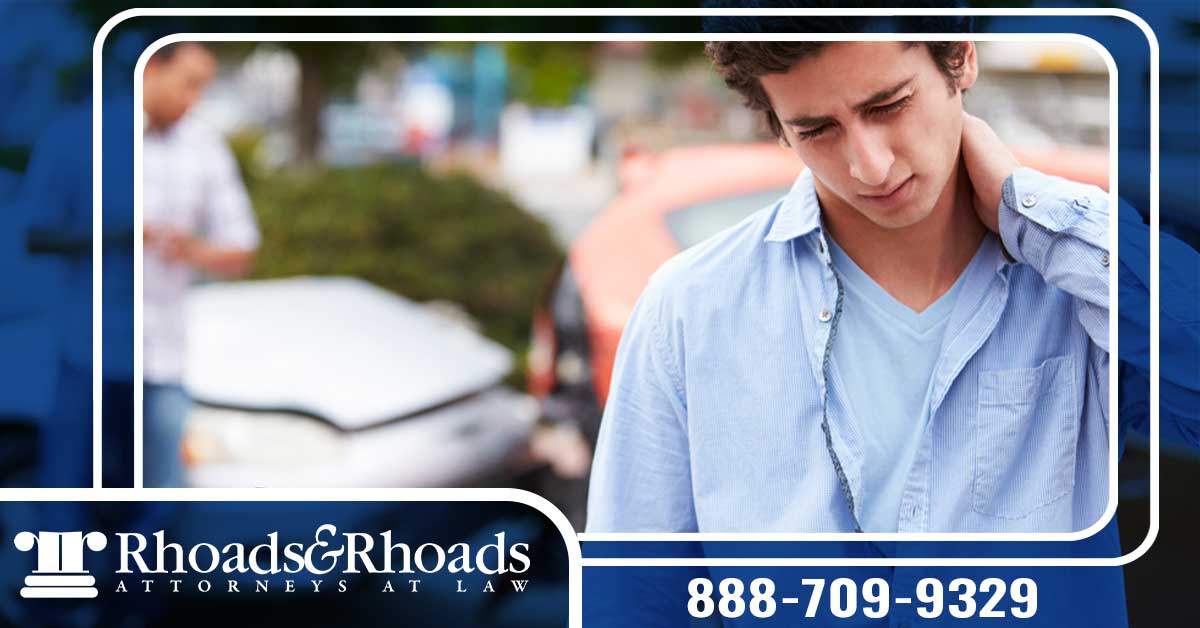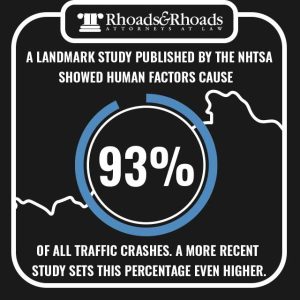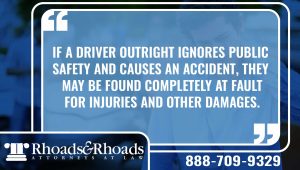
Key Points in This Article:
- Most car accidents involve some form of negligence, often due to human error or intent.
- Kentucky negligence law follows a pure comparative negligence system, meaning damages are awarded based on each party’s share of blame.
- Negligent driving, such as reckless driving, may significantly reduce the chances of claiming compensation.
Most car accidents involve some type of negligence. A driver ignores a yield sign and slams into another car. An enraged driver causes a multi-car pileup during a fit of road rage.

Variations of these accidents happen every day across America and right here in Kentucky. An overwhelming majority of car crashes are due to driver negligence.
Decades ago, a landmark traffic study published by the National Highway Traffic Safety Administration showed human factors cause 93% of all traffic crashes. A more recent NHTSA study sets this percentage even higher, finding that 94% to 96% of all accidents now arise from human error or intent.
If someone’s negligence causes you to suffer injuries in a car accident, you can hold them responsible. Personal injury compensation helps you cope with your injuries, recover your financial losses, and address the significant disruption to your life and relationships.
In this article, we’ll explain Kentucky negligence law including the elements of negligence. We’ll also describe how a lawyer may be able to help you pursue accident compensation.
What Are Kentucky’s Negligence Laws?
Pure Comparative Negligence
Kentucky is a pure comparative negligence state, meaning fault is distributed by percentage according to each person’s share of the blame for the accident. Damages are awarded based on your share of the blame.
If you were 10% at fault for the accident, your compensatory award would be reduced by 10%. As you can see, you’d still be able to collect the other 90% of awarded damages, so having partial fault doesn’t bar you from collecting compensation in a pure comparative negligence state like Kentucky.
Negligent Driving
Certain circumstances may dramatically reduce the chances of claiming compensation. A judge, jury, or insurance company may determine that a driver did something negligent that essentially prevents them from claiming a substantial award.
For example, reckless driving, which is defined under Kentucky Statute 189.290 as not driving “in a careful manner” is a criminal misdemeanor. This type of negligent driving may cause a driver to take most or all of the blame for an accident, minimizing their compensation.
Gross Negligence
Some driving behaviors may be viewed as gross negligence, which involves doing something unreasonably risky or violent on the road that leads to a tragic outcome. If a driver outright ignores public safety and causes an accident, they may be found completely at fault for injuries and other damages.

What constitutes gross negligence? Examples may include:
- Drunk driving
- Driving recklessly through a pedestrian zone
- Speeding through a school zone
- Exceeding the speed limit tremendously violates the law
- Road racing or road-raging
Negligence Per Se
Negligence per se is a legal term for the fact that a judge or jury doesn’t have to consider whether the defendant acted reasonably under the circumstances. As long as it is shown that their behavior violates the law, the injured person can recover compensation.
Every situation is unique, so contact a Kentucky personal injury lawyer to discuss your specific car accident. Certain factors or intricacies of the law may impact your case.
What are the Elements of Negligence?
There are four main elements of negligence in Kentucky personal injury and car accident cases.
Duty
The plaintiff must show that there is a duty of care. Kentucky drivers have a legal obligation to drive carefully and not cause harm to others on the road.
Breach
The plaintiff (or injured person) should demonstrate that there was a breach or violation of the duty of care by the defendant when they took certain actions.
Cause in Fact
This element of negligence calls for showing the following: But for the defendant’s failure in this situation, the plaintiff wouldn’t have been injured or harmed.
Proximate Cause and Damages
The plaintiff must show that the injuries are directly related to the accident and provide evidence to prove the value of damages. Pre-existing injuries don’t automatically prevent a plaintiff from recovering compensation in a car accident claim, but there must be evidence showing the accident aggravated the existing injury or contributed to related, new injuries.
Fulfilling the Elements of Negligence
Fulfilling the elements of negligence requires significant legal knowledge, plus plenty of evidence to back up your claims. Provide background information like the police report, witness statements, photos, videos, and your personal injury medical records.
Defenses to a Negligence Claim
The main defenses to a negligence claim involve demonstrating no law was violated, showing there was no duty of care, or providing evidence that the plaintiff’s injuries weren’t due to the defendant’s actions. Merely showing that the other person contributed to the accident isn’t usually enough due to Kentucky’s pure contributory negligence law.
Whether you’re the plaintiff or defendant, handling the defenses to a negligence claim takes significant time, evidence, and legal knowledge. Seek a consultation with a talented and knowledgeable lawyer who handles personal injury claims in auto accident cases.
Rhoads & Rhoads – Personal Injury Negligence Lawyers
After a personal injury, take the steps to protect your rights and identify the proper at-fault party for your negligence claim. While the other person’s negligence might seem obvious to you, proving your case in court or securing a car accident settlement from an insurance company may be more challenging than you’re expecting.
A Kentucky personal injury lawyer can provide insights and help you understand your most viable route to compensation. You’ll need a lawyer with the experience and expertise to handle car accident claims involving personal injuries. The right lawyer will listen to your story, inform you about your options, and help you build a strong case for proper compensation.
Turn to Rhoads & Rhoads in Central Kentucky for our decades of experience and genuine dedication to assisting you as you pursue the outcome you deserve. We offer free initial consultations and all cases are taken on a contingency fee basis, meaning no up-front payment is required.
We take payment only if we win or settle your case, so there is NO RISK to you. Connect with us at 888-709-9329 to schedule an appointment about your Kentucky medical negligence claim now.


